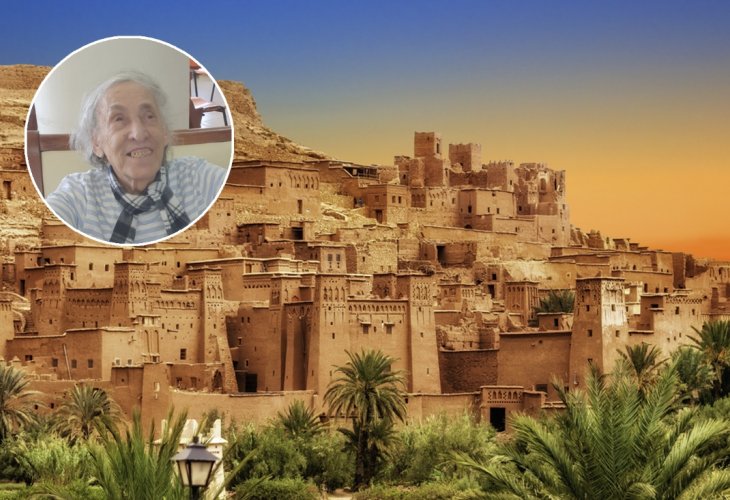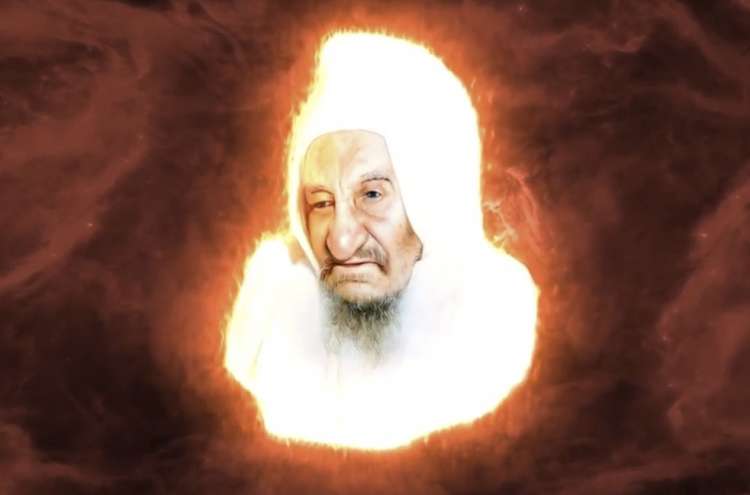The Holocaust
Saved from the Nazis in Morocco: The Incredible Survival Story of Chaim Ben Simon
How Moroccan Jews escaped Nazi deportation through a daring plan advised by the Baba Sali — a miraculous story of faith, courage, and survival
 (In the circle: Chaim Ben Simon)
(In the circle: Chaim Ben Simon)When Chaim Ben Simon was a baby, the Germans took control of Morocco. Until then, Moroccan Jews believed they would be protected by France, under whose authority Morocco had been a French protectorate. But in 1940, France fell to Nazi Germany, and the Vichy regime, collaborating with the Nazis, extended its rule over North Africa.
“The Germans came to Morocco to see how to send the Jews to the camps,” recalls Chaim. “They collected lists of Jewish families from across Morocco and began organizing ‘transportation’ to camps in Europe, where Jews were already being burned.”
Soon, anti-Jewish laws were enacted. Many Jews lost their jobs, and everyone was ordered to register with the local authorities. Fear spread rapidly, and Jewish life became increasingly difficult.
“My father was a metalworker,” Chaim remembers. “He owned two houseware shops in the city of Oujda with a partner. Once the anti-Jewish decrees were announced, life became unbearable, business dried up, food became scarce, and hunger spread throughout the Jewish community.”
Muslim collaborators sided with the Germans, adopting anti-Jewish laws and sometimes staging spontaneous pogroms. “There were Arabs who wanted to kill Jews just because they could,” Chaim recalls.
The King’s Secret Meeting with the Baba Sali
Above all, the greatest fear among Morocco’s Jews was deportation to the death camps in Europe. “The king of Morocco was considered a friend of the Jews,” says Chaim, “but the Germans gave him an ultimatum: hand over the Jews, or they would bomb Morocco. The king didn’t know what to do. He went to consult the Baba Sali, Rabbi Yisrael Abuhatzeira, who was deeply respected.”
King Mohammed V of Morocco met with the great sage Rabbi Yisrael Abuhatzeira (the Baba Sali, of blessed memory), who at that time served as head of the rabbinical court in Erfoud. The king asked his advice on how to respond to the Nazis’ demands.
“The Baba Sali gave him a surprising answer,” says Chaim. “He advised the king to sign a fake agreement with the Germans — promising that the Jews were indeed ‘in his hands’ and that whenever the Germans wished, they could ‘implement their final solution.’ The king agreed to this daring strategy and signed the document.”
As a result, the Germans believed the Jews of Morocco were under control, and didn’t rush to deport them. They focused instead on Jews in countries openly resisting them. “That bought Moroccan Jews precious time,” Chaim explains, “and they used it to escape.”
A Daring Jewish Rescue Operation
Taking advantage of that delay, the Jewish Committee of Oujda launched a massive, secret operation to smuggle Jews to southern France. The committee organized boats and planes, helping countless Jewish families flee every night.
“That’s how Moroccan Jewry was saved,” says Chaim with emotion. “Thanks to the Baba Sali’s wisdom and the king’s courage, we escaped the same fate that befell European Jews.”
After the War: Survival and Disillusionment
After World War II ended, the Ben Simon family remained in France, like many Moroccan Jews, hoping eventually to immigrate to the Land of Israel. They reached a transit camp in the city of Arnas.
“We wanted to move to Israel in 1948, when the State was founded,” Chaim recalls. “But my father heard from early immigrants that life there was very hard and that there were no jobs, and not enough food. At the same time, the French discovered that my mother was an excellent midwife. By modern standards she might seem ‘primitive,’ but she was skilled and highly respected. They offered her a job in a hospital, and so we stayed."

The War Ended, but the Hatred Remained
Eventually, the family returned to Oujda, Morocco, but their homecoming was bitter. “When we came back,” Chaim says, “we found that both our houses and my father’s shops had been seized by Arabs. They even stole a large sum of money from his wallet. The whole atmosphere had changed. Most Jews had already fled. The Germans were gone, but their hatred stayed behind.”
Anti-Jewish riots erupted again, fueled by anger over the establishment of the State of Israel. “Every time there was a war in Israel,” Chaim recalls, “the Muslims around us took revenge. Violence increased. We were always afraid.”
He remembers one traumatic day vividly: “I once saw a little Jewish girl riding her bicycle. Later, I worked with her father at the Government Printing Office in Israel. Suddenly, an Arab approached and stabbed her in the back. He didn’t even run away. We all saw it, but no one dared approach him out of fear. The police came, realized she was Jewish, and did nothing. The case was closed, just like that. I’ll never forget it. She was only a child.”
Escaping for the Sake of Faith
There were times when mobs stormed the Jewish quarter (mellah), attacking schools and homes. “Once,” Chaim recalls, “we hid inside our school for a full week. Those who couldn’t hide were killed. My father often hid under the counter in his shop, covered with clothes so he wouldn’t be discovered.”
Finally, the family could bear it no longer. “Relations with Arabs were sometimes peaceful, but every war in Israel reignited hatred. They beat us, murdered us, chased us. We were living in fear.”
In 1955, the Ben Simon family left Morocco for good. “We chose to come to the Land of Israel for the sake of the Western Wall, for the Torah, and for everything we loved,” says Chaim. “We had always prayed that God would save us, and He did.”
At the time, the Western Wall was still under Jordanian control, but it lived in their hearts. “Even if we couldn’t reach it physically,” Chaim says, “being in Jerusalem felt like standing before the Wall itself. When Israel won the Six-Day War and the Wall was liberated, it was one of the happiest days of my life.”
A Life Rebuilt in Israel
When the Ben Simons arrived, they were sent to a transit camp (ma’abara) in Haruvit, near Masmiyah. “We worked in cotton fields and farming,” Chaim recalls. “That’s where our life in Israel began.”
Today, at 81 years old, Chaim lives happily, surrounded by six children, fifteen grandchildren, and twelve great-grandchildren, in Jerusalem and Ashdod. He laughs, “Not bad, right?”
“I’m officially recognized as a Holocaust survivor and receive reparations from Germany. It’s painful to remember those days when six million Jews were murdered. But Moroccan Jewry was part of that story — we were caught between the hammer and the anvil. We were supposed to share their fate, but we were saved by a miracle.”
Music, Joy, and Gratitude
Chaim now lives in Rochlin Nursing Home in Jerusalem, under the care of the Ministry of Welfare. “I’ve always been musical,” he smiles. “I play guitar, harmonica, flute, keyboard — everything. I learned on my own. At 17, I already had a band with my brother, and we made people dance everywhere we went. Even here, I still play for the residents. On Mimouna we bring musicians and celebrate.”
He pauses and adds: “I grew up on music and joy. When a person is joyful, the joy stays in the body and in the heart. That’s why,” he says with a twinkle in his eye, “I look younger than my age. It’s because of the joy of life.”

